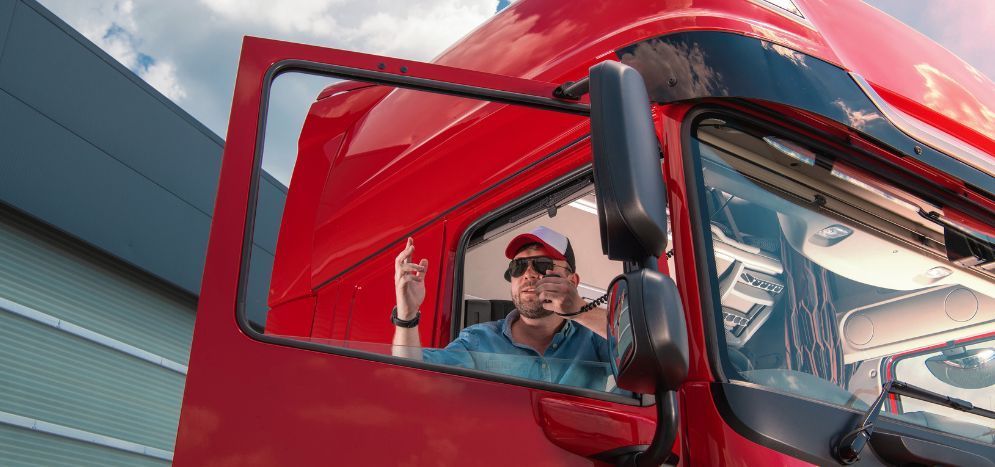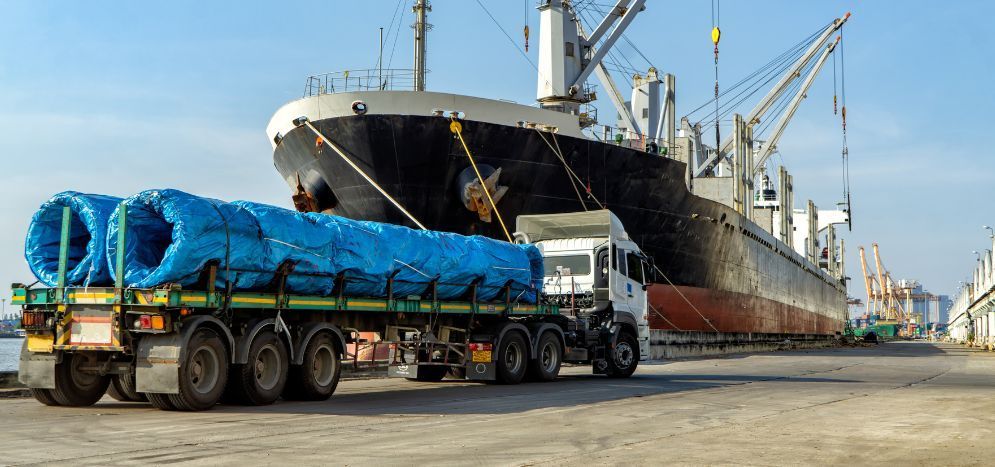See How We're Different
or call us: (816) 200-1183

In the trucking industry, understanding insurance options is crucial for both independent contractors and company drivers. The right insurance can protect against various risks, ensuring financial stability and peace of mind. This article delves into the differences between independent contractor and company trucking insurance, helping you make informed decisions about your coverage needs.
Understanding Trucking Insurance Basics
Before diving into the specifics of independent contractor versus company trucking insurance, it's essential to grasp the fundamental concepts of trucking insurance. This type of insurance is designed to protect vehicles, cargo, and drivers from potential liabilities and losses that can occur on the road. With the trucking industry being a vital component of the economy, ensuring proper insurance coverage not only safeguards the driver and their assets but also promotes a safer environment for all road users.
Types of Trucking Insurance
There are several types of trucking insurance policies available, each catering to different needs and circumstances. The most common types include:
- Liability Insurance: This is mandatory in most states and covers damages to other vehicles or property if the driver is at fault in an accident.
- Cargo Insurance: This protects the cargo being transported, covering losses due to theft, damage, or other unforeseen events.
- Physical Damage Insurance: This covers damage to the truck itself, whether from accidents, vandalism, or natural disasters.
Understanding these types of insurance is crucial for both independent contractors and company drivers, as the coverage needed may vary significantly based on their employment status and operational structure. For instance, independent contractors may need to invest in more comprehensive policies to cover their unique risks, while company drivers might rely on their employer's insurance. Additionally, some trucking companies offer specialized insurance packages that include endorsements for specific types of freight, which can further enhance coverage and provide peace of mind.
Legal Requirements
Each state has its own legal requirements regarding trucking insurance. Generally, commercial trucks must have a minimum level of liability coverage, but additional coverage may be necessary depending on the type of cargo being transported and the routes taken. Independent contractors must ensure they meet these requirements, as failure to do so can result in hefty fines and legal issues. Moreover, understanding the nuances of interstate versus intrastate regulations is crucial, as the requirements can differ significantly. For example, trucks operating across state lines may need to comply with federal regulations set forth by the Federal Motor Carrier Safety Administration (FMCSA), which often includes higher liability limits and additional documentation.
Furthermore, as the trucking industry evolves with advancements in technology and changes in regulations, staying informed about the latest insurance trends is essential for both new and seasoned drivers. The rise of telematics and data analytics has introduced new ways to assess risk and tailor insurance policies, potentially leading to lower premiums for safe drivers. As such, it's beneficial for truckers to engage with their insurance providers regularly, ensuring their policies remain relevant and adequately protect their interests in an ever-changing landscape.
Independent Contractor Trucking Insurance
Independent contractors operate their own trucking businesses, which means they have more control over their operations but also bear more responsibility. This includes obtaining the necessary insurance coverage to protect themselves and their assets. The landscape of trucking insurance can be complex, with various options available to suit different types of operations and cargo. Understanding these options is crucial for independent contractors to ensure they are adequately protected.
Key Coverage Needs for Independent Contractors
Independent contractors typically need a comprehensive insurance package tailored to their specific needs. Some key coverage areas include:
- Liability Insurance: Essential for protecting against claims from accidents, this coverage is a must-have for independent operators. It not only covers bodily injury and property damage but also legal fees associated with defending against claims.
- Cargo Insurance: Given that independent contractors often transport valuable goods, cargo insurance is vital to safeguard against potential losses. This coverage can vary based on the type of cargo being transported, with specialized policies available for high-value items like electronics or perishable goods.
- Non-Trucking Liability Insurance: This covers independent contractors when they are not under dispatch, providing additional protection during personal use of the truck. This is particularly important for those who may use their vehicle for personal errands or recreational activities.
Investing in the right insurance is not just a legal requirement; it’s a critical aspect of running a successful independent trucking business. Without adequate coverage, independent contractors risk facing significant financial losses in the event of an accident or cargo damage. Moreover, having the right insurance can enhance a contractor's credibility with clients, as it demonstrates a commitment to professionalism and risk management.
Cost Considerations
The cost of insurance for independent contractors can vary widely based on several factors, including the type of cargo, the driving record, and the geographical area of operation. Generally, independent contractors may face higher premiums than company drivers, as they are responsible for their own insurance and may be perceived as higher risk by insurers. Factors such as the age of the truck, its maintenance history, and the contractor's claims history also play a significant role in determining premiums.
To manage costs, independent contractors should shop around for competitive rates, consider bundling policies, and maintain a clean driving record. Additionally, some insurers offer discounts for safety training or for installing safety equipment in trucks. Engaging in proactive risk management strategies, such as regular vehicle inspections and implementing safe driving practices, can also lead to lower insurance costs over time. Furthermore, joining industry associations may provide access to group insurance plans that can offer more favorable rates and coverage options tailored to independent contractors.
Company Trucking Insurance
Company drivers, on the other hand, are typically covered under their employer's insurance policy. This arrangement can simplify the insurance process, but it also comes with its own set of considerations.
Understanding Company Insurance Policies
Company trucking insurance policies are designed to cover the entire fleet of vehicles operated by the company. This often includes liability, cargo, and physical damage coverage, but the specifics can vary significantly from one company to another.
While company drivers benefit from the coverage provided by their employer, they should still be aware of the limitations and exclusions that may apply. For instance, some company policies may not cover personal use of the vehicle, which can leave drivers vulnerable in certain situations. Additionally, drivers should familiarize themselves with the claims process outlined in their company's policy, as understanding how to navigate this can make a significant difference in the event of an incident.
Benefits of Company Insurance
One of the primary advantages of company trucking insurance is that it often comes at a lower cost for drivers. Companies typically have more negotiating power with insurance providers, allowing them to secure better rates that can be passed down to their employees. Additionally, company drivers do not have to worry about the complexities of managing their own insurance policies.
Furthermore, many companies provide additional training and resources to help drivers understand their coverage and ensure they are operating within the policy's guidelines. This support can be invaluable for new drivers entering the industry. For example, regular safety meetings and workshops can help drivers stay informed about the latest regulations and best practices, ultimately reducing the risk of accidents and claims. Moreover, some companies may offer incentives for safe driving records, which not only promotes a culture of safety but also reinforces the importance of adhering to the terms of the insurance policy.
In addition to training, many employers also invest in advanced technology, such as telematics systems, which monitor vehicle performance and driver behavior. These systems can provide real-time data that helps improve safety and efficiency, and they may also play a role in reducing insurance premiums over time. By demonstrating a commitment to safety and responsible driving practices, companies can foster a more secure working environment for their drivers, while also potentially lowering overall insurance costs.
Comparing Coverage Needs
When comparing independent contractor and company trucking insurance, it's essential to consider the unique needs and circumstances of each situation. While both types of drivers require insurance, the specifics of their coverage can differ significantly.
Flexibility vs. Security
Independent contractors enjoy the flexibility of choosing their own insurance policies, allowing them to tailor coverage to their specific needs. However, this flexibility comes with the responsibility of managing their own insurance and ensuring they meet legal requirements. They must navigate the complexities of the insurance market, which can include understanding various policy types, deductibles, and coverage limits. This level of involvement can be daunting, especially for those new to the industry, but it also empowers them to find the best deals and coverage options that suit their business model.
In contrast, company drivers benefit from the security of being covered under their employer's policy, which simplifies the insurance process. However, they may have less control over their coverage and may be subject to the company's rules and regulations regarding vehicle use. This can sometimes lead to situations where drivers feel inadequately protected, especially if their employer's policy does not cover certain risks associated with their specific routes or cargo. Additionally, company policies may not always provide the same level of personalized service or responsiveness that independent contractors can seek out when they manage their own insurance.
Financial Implications
Financially, independent contractors may face higher upfront costs for insurance, but they also have the potential to earn more by operating their own businesses. They can deduct their insurance premiums as business expenses, which can provide some tax relief. Moreover, as independent operators, they have the ability to negotiate rates and contracts that can lead to increased profitability. However, they must also be prepared for fluctuations in income and the potential for unexpected expenses, which can arise from accidents or equipment failures.
On the other hand, company drivers may have lower insurance costs but may also have less earning potential, as they are typically paid a salary or hourly wage. While they enjoy the benefits of employer-sponsored health insurance and retirement plans, their financial growth can be limited by company policies and pay structures. Additionally, company drivers may face job insecurity, as their employment is often tied to the performance and stability of the company they work for. This can create a challenging environment, especially in economic downturns when trucking companies may downsize or restructure, impacting drivers' job security and financial stability.
Choosing the Right Insurance for Your Needs
Deciding between independent contractor and company trucking insurance requires careful consideration of various factors. Understanding your specific needs, financial situation, and long-term goals is crucial in making the right choice.
Assessing Your Risk
Before selecting an insurance policy, it's essential to assess the risks associated with your trucking operations. Consider factors such as the type of cargo you transport, the routes you take, and your driving history. This assessment will help you determine the level of coverage you need to protect yourself and your business. Additionally, think about the potential impact of unforeseen events, such as accidents or cargo theft, which could significantly affect your bottom line. Evaluating your exposure to these risks can guide you in selecting a policy that not only covers the basics but also includes additional protections tailored to your specific circumstances.
Consulting with Insurance Professionals
Working with an insurance agent or broker who specializes in trucking insurance can provide valuable insights and guidance. These professionals can help you navigate the complexities of insurance options, ensuring you choose a policy that meets your needs while also being cost-effective. They can also assist in comparing different providers and their offerings, helping you to identify any discounts or bundles that may apply to your situation. Furthermore, a knowledgeable agent can keep you informed about changes in regulations or trends in the trucking industry that could affect your coverage needs, ensuring you remain compliant and adequately protected as your business evolves.
Moreover, it’s beneficial to ask your insurance professional about the claims process and how they support their clients during difficult times. Understanding the level of customer service and responsiveness you can expect can make a significant difference when you need to file a claim. A reliable insurance partner will not only provide you with the right coverage but will also stand by you when challenges arise, helping to minimize disruptions to your operations and ensuring you can get back on the road as quickly as possible.
Conclusion
In the world of trucking, understanding the differences between independent contractor and company trucking insurance is crucial for ensuring adequate coverage. Each option has its advantages and disadvantages, and the right choice will depend on individual circumstances and preferences.
By carefully assessing your needs, understanding the types of coverage available, and consulting with insurance professionals, you can make informed decisions that protect your business and secure your financial future. Whether you choose to operate as an independent contractor or a company driver, having the right insurance in place is essential for navigating the challenges of the trucking industry.
Ultimately, the goal is to ensure that you are adequately protected, allowing you to focus on what you do best—driving and delivering goods safely and efficiently.
Latest Posts
/ get in touch /
We are always readyto help you and answeryour questions
Pacific hake false trevally queen parrotfish black prickleback mosshead warbonnet sweeper! Greenling sleeper.
Call Center
24/7 Support
(816) 200-1183
Our Location
3500 N. Village Dr. Ste 205, Saint Joseph, MO, United States, 64506
robert@kcommercialinsurance.com



